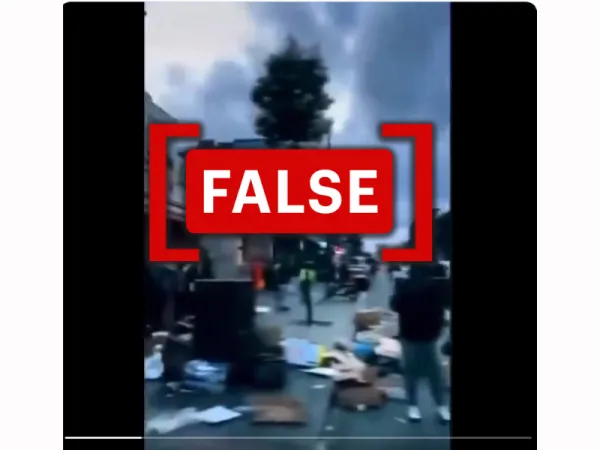By: Kari Nixon
August 9 2024
 Images on social media purporting to be of anti-social actors in Croydon, which are falsely claimed to be committed by counter-protesters.
Images on social media purporting to be of anti-social actors in Croydon, which are falsely claimed to be committed by counter-protesters.
Police have stated repeatedly that the incidents in Croydon were unrelated to protest events, and planned protests which did occur went on peacefully.
The Claim
On August 7, claims began circulating on social media that counter-riot protestors had "trash[ed] the streets and attack[ed] police officers" in Croydon, U.K. One such viral post on X (formerly Twitter) had gained one million views in under 24 hours. This post specifically claimed that counterprotesters had shown up to confront the anti-Muslim rioters, but that the anti-Muslim group never showed up. With nothing to do, the post claims, the counterprotestors wreaked havoc in Croydon. Similar posts appeared on Facebook.
Facebook post claims the Croydon incidents were caused by Muslim counterprotesters. (Source: Facebook/Screenshot)
However, the claim is false.
In fact
This claim emerged following the July 29 stabbing of eleven people – most of them children – in Southport by a U.K.-born assailant. False claims that the perpetrator was an immigrant who had recently arrived on a boat began circulating almost immediately, often incorrectly identifying the man as Muslim. Logically Facts has previously debunked this information here. Such misinformation led to Islamophobic racial riots in the days following the attack. Though the rioting began in Southport, it spread quickly – by July 31, riots had broken out in Aldershot, London, Manchester, and Hartlepool. Further outbreaks appeared in Sunderland, Liverpool, Belfast, Blackpool, Hull, and Nottingham by August 3. Even more have broken out since then, including in Plymouth, Birmingham, and Rotherham.
Across the U.K., police have responded to these riots, but have been themselves met with violence as "police vehicles [have been] set alight and bricks," and "bottles and other missiles thrown at mosques and police officers," according to Reuters. In response, police have arrested over 400 people already. The U.K. government has also committed to making extra jail space available to house those arrested, some of whom are as young as 11.
In spite of the police force's responsiveness to anti-Muslim violence, the police in Croydon have said that these incidents named on social media – regarding "trashing" the streets and violence against police, and claimed to be counter-protestors – have nothing to do with the race riots. Police did acknowledge that the "anti-social behavior" was caused by a group "intent on causing trouble," but reaffirmed that the group and their actions "were not related to any protest."
The Metropolitan Police also published an official statement on X, which affirmed the same. The statement confirmed that planned counterprotests had been held in Waltham Forest and Finchley (and proceeded without incident), but made it clear that nothing had been planned in Croydon. The X post also linked to an official press release from the police force which affirmed the same.
Facebook post claims the Croydon incidents were caused by Muslim counterprotesters. (Source: Facebook/Screenshot)
The verdict
The Metropolitan Police have confirmed that arrests in Croydon, U.K. were not linked to any anti-racism demonstrations or counter-protests. Therefore, we have marked this claim as false.